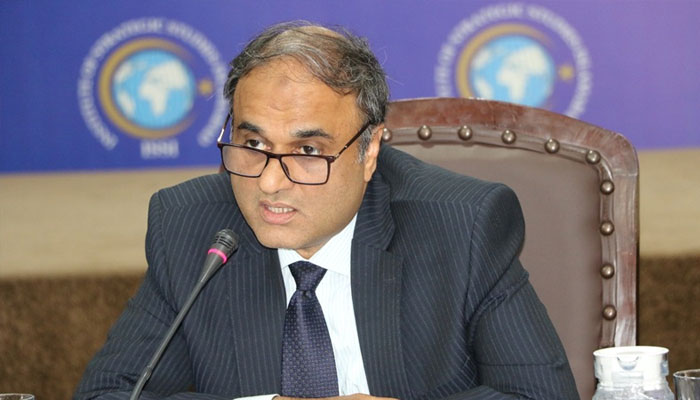‘Pakistan committed to Saarc’
Islamabad : Imran Ahmed Siddiqui, Additional Secretary, Ministry of Foreign Affairs, has reaffirmed Pakistan’s unwavering commitment to uphold its Charter, principles and priorities.
Mr Siddiqui was delivering keynote address at a seminar on ‘Prospects and challenges of regional cooperation in South Asia: role of South Asian Association for Regional Cooperation (Saarc)’ organised here by Institute of Strategic Studies (ISS).
Mr Siddiqui emphasised Pakistan’s considered approach to play its role in fostering a harmonious regional environment where no single state could impose its agenda on the smaller counterparts. He positively evaluated the incremental resumption of Saarc activities since 2023, after a period of ineffectiveness due to bilateral issues, Covid-19 pandemic, and regional security problems. However, the organisation’s complete revival remains a rocky road.
He called for the member countries to adhere to the principles of mutual respect and sovereign equality in their journey to make South Asia a prosperous, developed, and economically integrated region.
Dr Saeed Ahmad Rid from Quaid-i-Azam University discussed the historical pattern of socio-cultural and political linkages in South Asia which were disrupted by the unnatural demarcations made by colonial powers rendering its populace to the levels of underdevelopment. He outlined a number of steps in public and private arenas to enhance people-to-people connections among South Asian states.
Dr Zahid Shahab Ahmed from National Defence College, UAE, emphasised that the geographical, social and political context made South Asia a unique region, therefore, it was not justified to draw a comparison between Saarc and other regional fora like European Union. He highlighted several structural as well as practical challenges restricting the efficient working of Saarc including competition between its members to find international markets outside South Asia, inter-state disputes, rising inclination
among several members toward sub-regionalism, funding issues, besides others.
Former ambassador Babar Amin observed that Indian approach to regional integration was motivated by its political and ideological inclinations. While expressing disappointment over India’s decisions like denial of visa to Pakistani students studying in South Asian University, New Delhi, he called civil society to play an active role in pressurising policymakers in New Delhi to revisit their approach.
Former ambassador of Nepal Yuba Nath Lamsal stressed that South Asian states and societies had more common characteristics than divisive issues. He emphasised that cooperation, and not competition in South Asia could guarantee a better future to the forthcoming generations.
-
 Prince Harry And Meghan Unlikely To Meet Royals In Jordan
Prince Harry And Meghan Unlikely To Meet Royals In Jordan -
 Hero Fiennes Tiffin Shares Life-changing Advice He Received From Henry Cavill
Hero Fiennes Tiffin Shares Life-changing Advice He Received From Henry Cavill -
 Savannah Guthrie's Fans Receive Disappointing News
Savannah Guthrie's Fans Receive Disappointing News -
 Prince William Steps Out For First Solo Outing After Andrew's Arrest
Prince William Steps Out For First Solo Outing After Andrew's Arrest -
 Jake Paul Chooses Silence As Van Damme Once Again Challenges Him To Fight
Jake Paul Chooses Silence As Van Damme Once Again Challenges Him To Fight -
 Google Disrupts Chinese-linked Hacking Groups Behind Global Cyber Attacks
Google Disrupts Chinese-linked Hacking Groups Behind Global Cyber Attacks -
 Four People Killed In Stabbing Rampage At Washington Home
Four People Killed In Stabbing Rampage At Washington Home -
 Meghan Pushes Prince Harry Into Territory That’s Dangerous To His Brand: ‘She Isn’t Hearing A Word Of It’
Meghan Pushes Prince Harry Into Territory That’s Dangerous To His Brand: ‘She Isn’t Hearing A Word Of It’ -
 Christina Applegate Reflects On Lasting Impact Of Being Molested In Childhood
Christina Applegate Reflects On Lasting Impact Of Being Molested In Childhood -
 Martin Short Makes Big Decision Following Tragic Death Of Daughter
Martin Short Makes Big Decision Following Tragic Death Of Daughter -
 Antarctica’s Mysterious ‘gravity Hole’: What’s Behind The Evolution Of Earth’s Deep Interior?
Antarctica’s Mysterious ‘gravity Hole’: What’s Behind The Evolution Of Earth’s Deep Interior? -
 Hilary Duff Addresses Ashley Tisdale's 'toxic Mom Group' Claims And Matthew Koma's Firey Response
Hilary Duff Addresses Ashley Tisdale's 'toxic Mom Group' Claims And Matthew Koma's Firey Response -
 Jack Hughes's Proximity To Trump Angers Tate McRae Fans
Jack Hughes's Proximity To Trump Angers Tate McRae Fans -
 Neve Campbell Opens Up About Her 'difficult Decision' To Not Sign 'Scream 6'
Neve Campbell Opens Up About Her 'difficult Decision' To Not Sign 'Scream 6' -
 Nobel-winning Scientist Resigns From Columbia University After Epstein Links Revealed
Nobel-winning Scientist Resigns From Columbia University After Epstein Links Revealed -
 Prince William Remarks At BAFTAs 'indicative' Of King Charles Physical, Mental Health Too
Prince William Remarks At BAFTAs 'indicative' Of King Charles Physical, Mental Health Too




